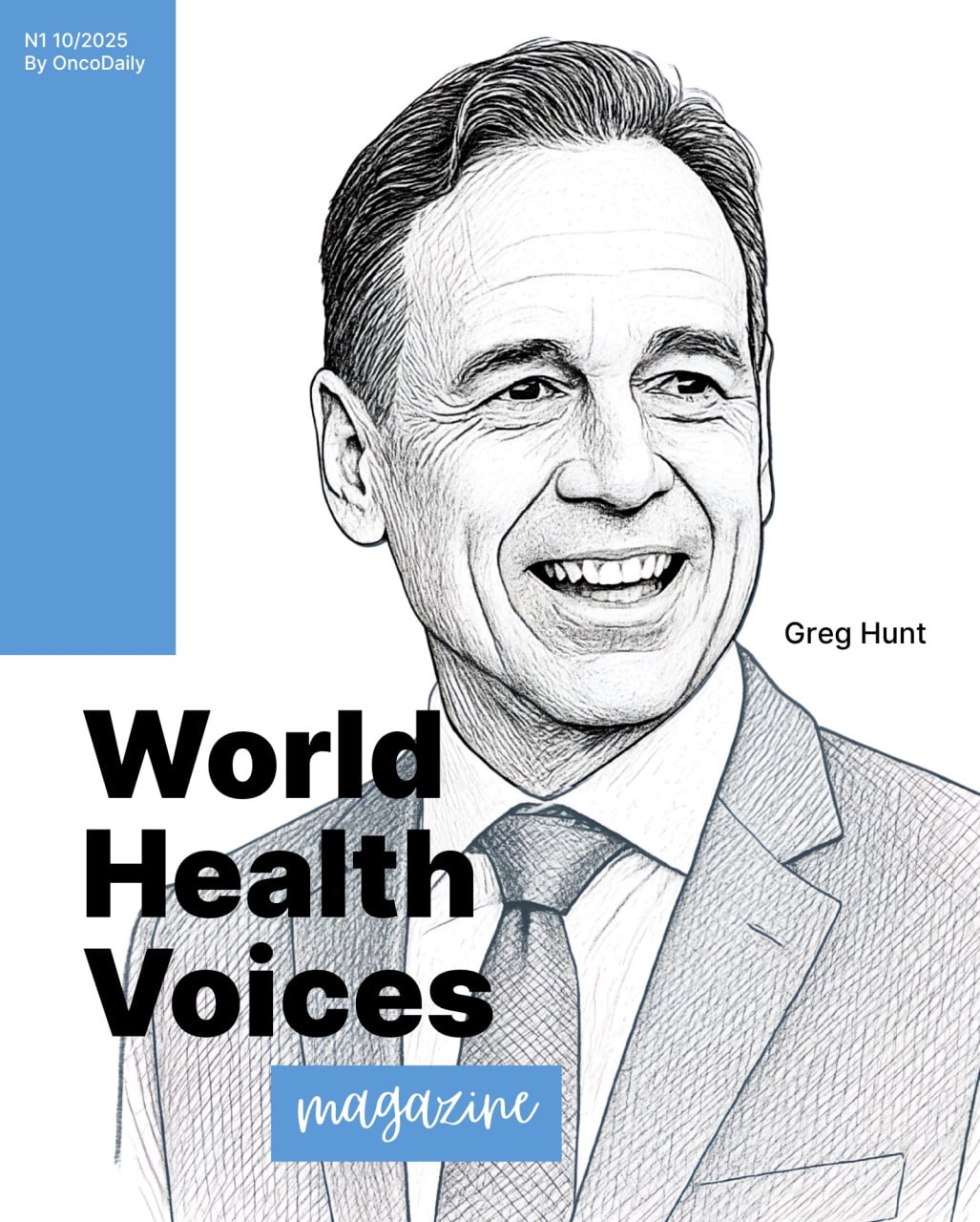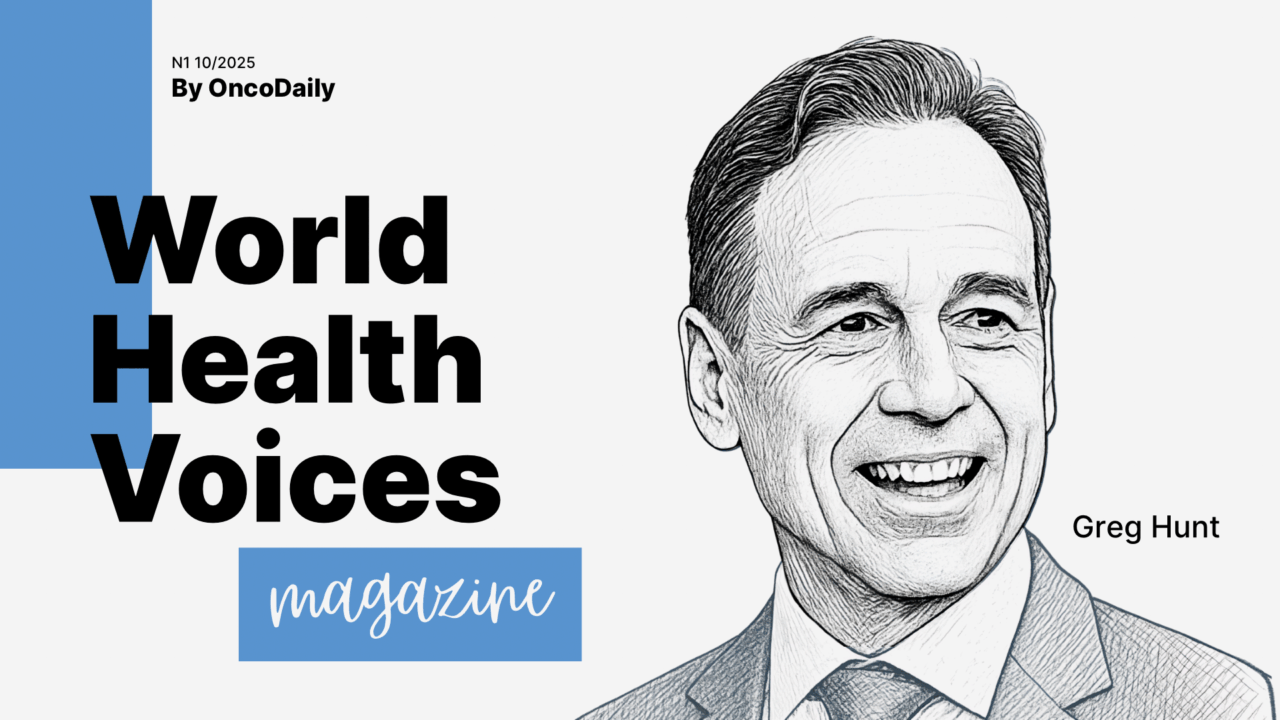OncoDaily is proud to launch its new digital magazine and podcast, World Health Voices, under the leadership of Professor Gevorg Tamamyan as its Editor-in-Chief and Podcast Host — a platform where global leaders, visionaries, and members of the health community share their stories, insights, and ideas to shape the future of global health. Through thoughtful conversations and in-depth features, World Health Voices will spotlight the challenges, breakthroughs, and human journeys defining our collective pursuit of better health for all.
The first cover story of this new series features Professor Greg Hunt, former Minister of Health of Australia, whose leadership and vision continue to inspire progress in healthcare, innovation, and global equity.
Professor Greg Hunt, former Minister of Health of Australia, has lived his career with a clear sense of mission. Beyond health, he served as Minister for the Environment, Industry, Innovation, Science, and Sport, and spent decades in government shaping national policy. Today, he is Honorary Melbourne Enterprise Professor at the University of Melbourne and Chair of the Turner Institute for Brain and Mental Health Advisory Council at Monash University.
Looking back, Prof. Hunt traces his path to the lessons of his family. “I grew up in a house focused on three things,” he says. “First, challenge yourself—your contest is with yourself. Second, service—how can you help people? And third, belief in yourself. Not blindly, but with the conviction that you can get there.” Those three principles, he explains, gave him “a solid foundation of values and purpose.”
From early on, he imagined his life in stages. “I thought of it in three phases: preparation from 18 to 35, parliamentary service from 35 to 56, and now a portfolio career with academic, philanthropic, and commercial pillars.” This structure gave him direction—and when opportunity came, he was ready.
Though not trained as a clinician, Hunt found himself leading Australia’s health system for nearly six years. “I was trained in law, international relations, and human rights,” he recalls. “But being Health Minister was the best job I’ve ever had—and am ever likely to have. The hardest, the most intense, especially during the pandemic. But also the most meaningful.”
What made it meaningful was impact. “When you can bring a new immunotherapy like Keytruda into the Pharmaceutical Benefits Scheme, or melanoma treatments like Tafinlar and Mekinist, and then meet the patients whose lives have been changed—that is profoundly affirming. It reminds you why the work matters.”
Fighting for Tobacco Control
One of Greg Hunt’s toughest battles was against tobacco and e-cigarettes. “Almost 50,000 Australians die each year from smoking-related diseases, with around 20% from lung cancer alone,” he says. Determined to reduce smoking rates from 25% to 10%, he pushed for aggressive reforms.
“The tobacco companies tried to present vaping as an ‘exit ramp,’” he recalls. “But the evidence from the Australian National University showed it was overwhelmingly an ‘on-ramp.’ For most, it was a first engagement with nicotine. That was unacceptable.”
Australia’s solution was strict regulation. “We made vaping prescription-only. That decision has kept our vaping rates much lower than in North America and Europe, where you see a flood of vaping stores and public health officials are deeply worried. Our strong approach has made a real difference.”
Why not go further—why not prohibit cigarettes altogether? Greg Hunt’s answer is pragmatic. “If you were starting today, you probably wouldn’t allow it. But because it is so embedded, prohibition would create enormous criminal markets. We’ve already seen the rise of illegal tobacco markets and gang-related ‘tobacco wars.’ Absolute prohibition would magnify that problem.”
Instead, Hunt focused on “mitigation of harm.” Education campaigns, strict regulation, and very high cigarette taxes have all played a role. “Some people dislike the high taxes, and some say they have contributed to illegal markets. But the public health consequences of smoking are catastrophic. Over the last quarter century, we’ve reduced smoking from 25% to 10%. That saves lives.”
Towards Eliminating Cervical Cancer
Another area where Prof. Hunt believes Australia has become a world leader is HPV vaccination. “We were very fortunate,” he says. “Ian Frazer developed Gardasil, which later became Gardasil 9. It’s provided in schools on a voluntary but recommended basis—both my children received it.”
“We have the chance to be the first country to come close to eradicating cervical cancer as a fatal disease.”
Vaccination has been combined with advances in screening. “We moved to a new liquid biopsy test as part of the national cervical cancer screening program. With vaccination, screening, and now immunotherapies and targeted therapies, we have the chance to be the first country to come close to eradicating cervical cancer as a fatal disease—perhaps by the 2030s. That is our national objective.”
Health Equity and Global Challenges
When asked about disparities in cancer and non-communicable diseases across the world, Greg Hunt points directly to the principle of equity. “Geography too often defines whether a patient is going to be cured, treated, or even receive good palliative care,” he reflects. “That is the reality we must change.”
For Hunt, access to medicines is at the heart of the issue. “If medicines can be made available on a differential pricing basis, with the support of developed countries and global organisations like the Gates Foundation, CEPI, or Gavi, then we can transform outcomes,” he explains. “Building an economy from low-income to middle-income to high-income is the ultimate solution, but that may take decades. In the meantime, there is a duty to provide support.”
He points to Australia’s own Pharmaceutical Benefits Scheme as a model: “The government pays the international price and the consumer pays about $30 per prescription, even for a medicine with a $100,000 price tag. That principle can be adapted globally. Pharmaceutical companies are not losing revenue if they sell at a reduced price to low-income countries—they simply wouldn’t have made those sales otherwise. By differential pricing—high, medium, and low income economies—you can extend lifesaving immunotherapies and targeted therapies to people who otherwise would never access them.”
Achievements as Health Minister
Reflecting on his time as Minister, Greg Hunt is clear about what he sees as his greatest accomplishments. “During COVID, tragically, the world lost 1.6 years of life expectancy between January 2019 and December 2021,” he says, citing The Lancet’s Global Burden of Disease Study. “The United States lost two years. Australia gained 0.2 years. In the greatest health crisis in peacetime since the Second World War, that has to be number one.”
“The United States lost two years. Australia gained 0.2 years.”
The pandemic also accelerated lasting transformation. “Before COVID, Australia used about 40,000 telehealth services a year in a country of 37 million. We now do 40 million a year. That architecture was built during the pandemic, and within three months I said to the Prime Minister and Treasurer, ‘This has to be permanent.’ They agreed. That was a revolution.”
Hunt also highlights reforms in aged care and mental health, and the long-term investment through the Medical Research Future Fund. “We laid down a national plan with a $750 million Rare Cancers, Rare Diseases Clinical Trials Program. It has been transformative—focusing on researchers, translation, and great national missions: stem cells, Indigenous health, genomics, and the Million Minds Mental Health Program. That’s the legacy.”
Mentors and Foundations
Throughout his career, Hunt drew inspiration from mentors. His father, a member of state parliament for 30 years, “was a parliamentarian in the truest sense—serious about the duty, not the politics.” At Melbourne University, Professor Cheryl Saunders shaped his legal thinking, while at Yale, Professor Michael Reisman—“one of the great international and human rights lawyers of the last half century”—left a lasting mark. Within parliament, Alexander Downer, Australia’s long-serving foreign minister, became his most significant mentor.
Asked about advice for the younger generation, Greg Hunt replies with characteristic clarity. “Think of your life as a purposeful plan. Imagine yourself at 70, looking back. What are the phases you would want to see? Not necessarily jobs, but phases of life.”
He describes his own four foundations: family and friends, values, creativity, and the physical. “These are who Greg Hunt is,” he says. “The roles add purpose, but they don’t define me. Otherwise, if you lose your job, you lose your identity. Everyone needs to know what makes them who they are—whether it’s faith, music, painting, gardening, or sport. For me, it is those four foundations.”
On Role Models and Leadership
Prof. Hunt resists the idea of having personal role models. “I’ve never idealised or idolised anyone,” he says. “I respect enormously—Mandela, Churchill, Gandhi, Mother Teresa—but I’ve never thought, I wish I were them. I take lessons from many, but I focus on service and on building something of my own.”
If he had to describe himself in a single sentence? “Somebody who believes in service, loves sport, loves his family, and gets the most satisfaction from helping people individually—and from building national and international solutions.”
Looking Ahead
Asked who should be interviewed next, Greg Hunt recommends Professor Brendan Murphy, Australia’s Chief Medical Officer during COVID and later Secretary of Health. “He is a clinician, a nephrologist, a professor, and he played a critical role during the pandemic,” Hunt says. Internationally, he mentions the President of Finland—“an unexpected bridge between Europe and the U.S. President, built on a shared love of golf.”
Before closing, Hunt shares a message for the oncology community. “I want to thank the unbelievable talent and effort of oncology researchers, clinicians, and innovators. They are the real heroes—those developing new surgical techniques, drugs, and public health strategies. They are transforming the store of knowledge, not just treating patients case by case, but reshaping the future.”
Today, Hunt balances his academic and philanthropic commitments with a role as non-executive director at Haemalogix, a biotech company developing innovative therapies for multiple myeloma. “It’s about identifying a new antigen target and developing an antibody against it,” he explains. “In early trials, survival increased by more than 45%, with overall response rates nearly double the base. Always subject to later trials and approvals, but the phase two results are very promising. That’s heartening.”
Looking back, Greg Hunt’s career has been defined by vision, service, and resilience. Looking forward, it is guided by the same principle that shaped him as a child: the contest is not against others, but against oneself—to challenge, to serve, and to believe.
Interview by Gevorg Tamamyan, Editor-in-Chief of OncoDaily
You may watch the full podcast here:


